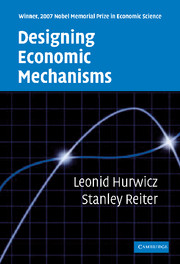Crossref Citations
This Book has been
cited by the following publications. This list is generated based on data provided by Crossref.
Baliga, Sandeep
and
Sjöström, Tomas
2008.
The New Palgrave Dictionary of Economics.
p.
1.
Loehman, Edna T.
2009.
Voluntary Cost-Sharing for Environmental Risk Reduction: A Pollution Abatement Case Study.
Group Decision and Negotiation,
Vol. 18,
Issue. 4,
p.
349.
Lipovetsky, Stan
2009.
Optimal hierarchy structures for multi-attribute-criteria decisions.
Journal of Systems Science and Complexity,
Vol. 22,
Issue. 2,
p.
228.
Aoki, Masahiko
2009.
Institutions as Cognitive Media between Strategic Interactions and Individual Beliefs.
SSRN Electronic Journal,
Archibald, Sandra O.
Bochniarz, Zbigniew
Gemma, Masahiko
and
Srebotnjak, Tanja
2009.
Transition and sustainability: empirical analysis of environmental Kuznets curve for water pollution in 25 countries in Central and Eastern Europe and the Commonwealth of Independent States.
Environmental Policy and Governance,
Vol. 19,
Issue. 2,
p.
73.
Kakhbod, Ali
and
Teneketzis, Demosthenis
2009.
An individually rational, budget-balanced mechanism that implements in Nash equilibria the solution of the unicast service provisioning problem.
p.
1377.
Galbusera, Luca
Gatti, Nicola
and
Romani, Carlo
2009.
A mechanism design approach to the stabilization of networked dynamical systems.
p.
5845.
Durlauf, Steven N.
and
Blume, Lawrence E.
2010.
Game Theory.
p.
223.
Yilmaz, Murat
O’Connor, Rory V.
and
Collins, John
2010.
Systems, Software and Services Process Improvement.
Vol. 99,
Issue. ,
p.
177.
Yilmaz, Murat
and
O'Connor, Rory V.
2010.
Maximizing the value of the software development process by game theoretic analysis.
p.
93.
Helbing, Dirk
and
Balietti, Stefano
2010.
Fundamental and Real-World Challenges in Economics.
SSRN Electronic Journal,
Sharma, Shrutivandana
Babich, Volodymyr
Teneketzis, Demosthenis
and
van Oyen, Mark P.
2010.
A Decentralized Mechanism Implementing in Nash Equilibria the Optimal Centralized Solution of a Supply-Chain Problem.
SSRN Electronic Journal,
Schuh, G.
Kampker, A.
and
Wesch-Potente, C.
2011.
Condition based factory planning.
Production Engineering,
Vol. 5,
Issue. 1,
p.
89.
Gottinger, Hans
2011.
Network Economies for the Internet-Application Models.
iBusiness,
Vol. 03,
Issue. 04,
p.
313.
Wang, Aihe
Luo, Yunfeng
and
Li, Yan
2011.
A research of institution design based on social choice.
p.
693.
Gottinger, Hans W.
2012.
Network Economies for the Internet.
Modern Economy,
Vol. 03,
Issue. 04,
p.
408.
Kaleta, Mariusz
and
Toczyłowski, Eugeniusz
2012.
Modeling Multi-commodity Trade: Information Exchange Methods.
Vol. 121,
Issue. ,
p.
3.
Helbing, Dirk
2012.
Social Self-Organization.
p.
261.
Healy, Paul J.
and
Mathevet, Laurent
2012.
Designing stable mechanisms for economic environments.
Theoretical Economics,
Vol. 7,
Issue. 3,
p.
609.
WOLFSON, DIRK J.
2012.
Situational Contracting: Building Reciprocity between Rights and Obligations.
Governance,
Vol. 25,
Issue. 4,
p.
661.



